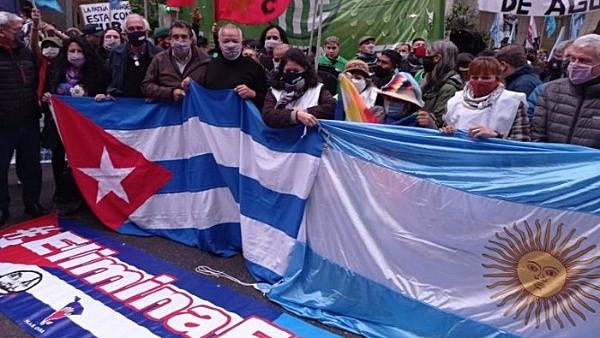The seventh summit of the Community of Latin American and Caribbean States (CELAC), hosted by Argentina, the country which temporarily presides over the bloc, was preceded by a joint summit of social organizations and trade unions. This summit took place on the afternoon of January 23, in Buenos Aires, at the former Army Mechanics School. This school was once a clandestine detention center during the Argentine military dictatorship, which today functions as a human rights space and museum of memory.
With the presence of about 300 leaders of social organizations, unions and people’s movements from all over the region, the meeting served as a forum for debate on the most relevant issues affecting the different countries in the context of the CELAC conference.
The Latin American and Caribbean Confederation of State Workers (Clate), one of the organizations participating in the social summit, highlighted that the Social Summit is part of the permanent search to “institutionalize permanent spaces for dialogue between governments and social organizations and movements, and the participation of organized civil society.”
Regional challenges
As countries in the region face growing challenges such as attacks on democracy, the increase in socioeconomic inequality and hunger, the growth of the extreme right, the impact of US imperialism through blockades and sanctions, and the erosion of national sovereignty, social leaders sought to formulate a people’s analysis of the situation.
One of the organizers of the summit, Manuel Bertoldi, a member of the secretariat of Social Movements of ALBA and the International Peoples’ Assembly, underlined that the space was crucial to strengthen analysis and relations across the region. This in turn would help strengthen the struggle for sovereignty and self-determination.
Deputy Secretary of International Relations of CUT Brazil, Quintino Severo, celebrated the return of face-to-face dialogue between popular movements and social and political organizations in the region. “It’s an important moment to mark this return,” he pointed out, highlighting some of the main issues according to CUT.
“The continent must reinforce the question of democracy, the actions and the defense of self-determination of the peoples. We also have to deal with the fight against hunger and social inequalities. Our region is very unequal, and we need more practical action in this fight. Evidently, this comes with the creation of employment and income, social and labor rights; it is something much broader,” he said.
“Regional integration is the most difficult issue, but without a doubt, doing it on a social, economic, and political level is fundamental,” he adds.
In terms of regional economy, the need to develop political autonomy was also a crucial part of the discussion, especially given the challenge of debt imposed on countries through entities such as the International Monetary Fund (IMF).
Mobilization
On January 24, the day of the CELAC presidential summit, the participants of the Social Summit participated in a march downtown towards the Sheraton Hotel, where the heads of state and government will be meeting. The slogan of the march was “Latin American and Caribbean Integration: To halt the new Plan Cóndor in the region”.
This article was written by Fernanda Paixão and originally published on Brasil de Fato.





